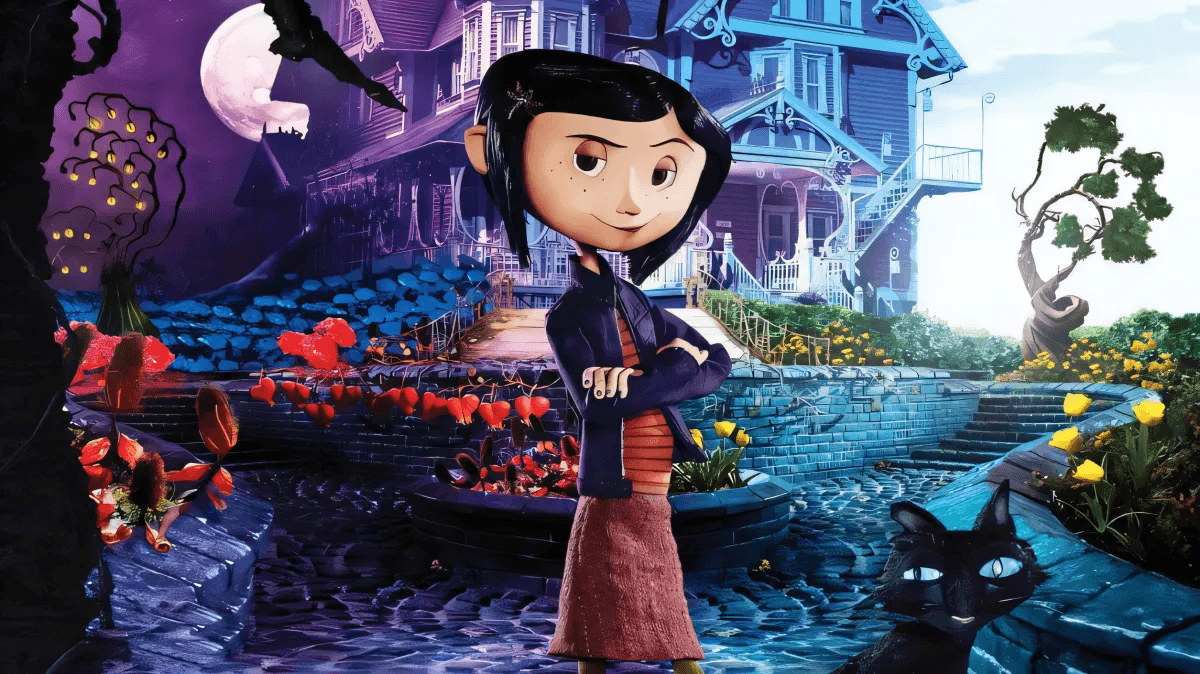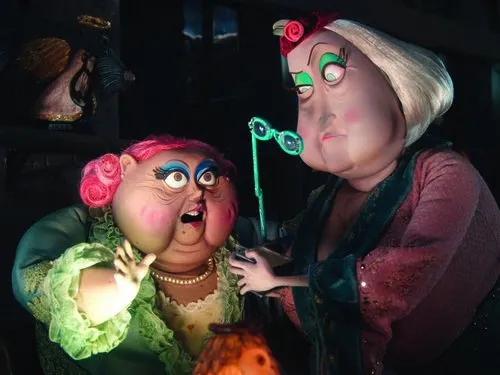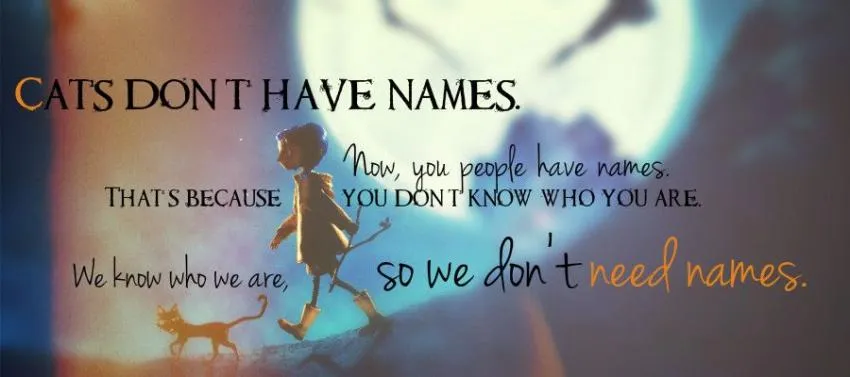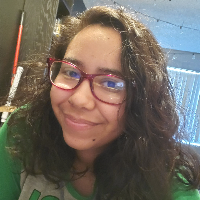The Philosophy Of Names In The Movie Coraline

When I first saw the movie Coraline, I was horrified by the creepiness, so I made sure to never watch it again. But I saw it as a child, so of course, I was scared. However, as an adult, it’s still terrifying, which I respect and love.
Because of this, I read the book and there’s something I noticed that makes me love the written story more- the motif of names with identity and listening. It sounds weird, but there’s a philosophy behind names and identity. I kid you not, there’s literal philosophy about names and their semantics. But don’t worry, I won’t bore you with the theories and their technicality.
And while there aren’t too many differences between the book and the movie, there’s also a line in the book that establishes that names carry existentialism and capitalist ideologies. I’ll try not to make it too complicated.
The Eyes As Our Souls: How Our Name Is Our Identity.
In the film, the part where Coraline meets the ghost children and asks what their names were, one of them responds by saying, “Don't remember our names.”
Here, it’s seen that the ghost children were victims of the beldam since their eyes are buttons. Seemly random, they tell her that if she finds their eyes, their souls will be free. And through the saying of “the eyes are the windows to the soul,” this reveals that the beldam stole their soul by stealing their eyes.
But because their souls were taken, they don’t know who they are, hence why they don’t remember their names. This then reveals how our names define who we are.
When names are used, they’re used to understand a person in reference, meaning names come with reputations that define us, which is based on our personality, or aka the soul of the person. And since taking the children’s souls is what makes the beldam powerful, there seems to be some kind of power in having names since in real life there's an identity thief and even respectability with having certain titles.

It’s Coraline, Not Caroline! The Respectability Of Listening.
Throughout the film, Coraline’s neighbors call her Caroline instead of Coraline. They get it right sometimes, but in the book, they always say Caroline, which she actively corrects as Coraline each time.
But why is this important? Why does it matter? Her neighbors know who she is, and Coraline knows they refer to her when they mispronounce her name.
The story offers a simple answer with the respectability of listening. When the neighbors get her name wrong, it’s always during interactions where they are talking about themselves, which is always about their past and who they were.
According to Miss Spink and Miss Forcible, they were actresses in the circus, which they linger on with nostalgia whenever they talk to Coraline. But even if what they say is not stories, when Coraline says something, it’s dismissed as they continue speaking, revealing that they don’t listen, which is why they don’t pronounce her name right.
"How are your dear mother and father?" asked Miss Spink.
"Missing," said Coraline. "I haven't seen either of them since yesterday. I'm on my own. I think I've probably become a single child family."
"Tell your mother that we found the Glasgow Empire press clippings we were telling her about. She seemed very interested when Miriam mentioned them to her."
"She's vanished under mysterious circumstances," said Coraline, "and I believe my father has as well."
"I'm afraid we'll be out all day tomorrow, Caroline lovey," said Miss Forcible. "We'll be staying with April's niece in Royal Tunbridge Wells."
Though because Coraline listens to them, she knows Miss Spink and Miss Forcible’s names and stories, establishing them as people to Coraline. However, in comparison to Mister Bobo, he only spoke of training his mice singing and stunt performances.
This has made Coraline think of him as a crazy old man and nothing else beyond that. This is seen when she learns his name since it is written that “It had never occurred to Coraline that the crazy old man upstairs actually had a name...If she'd known his name was Mr. Bobo she would have said it every chance she got.”
Afterward, once she corrected Mister Bobo her name was Coraline as she said his name, he started pronouncing her name correctly.
"It's Coraline, Mister Bobo," said Coraline. "Not Caroline. Coraline."
"Coraline," said Mr. Bobo, repeating her name to himself with wonderment and respect.
Because they both got their names right, it seems like this is a moment where they’re truly listening and understanding who they are.
In other words, understanding someone’s name and who they are is accompanied by listening, so the mispronunciation represented their inattentiveness to each other. While Caroline knew the names of Miss Spink and Miss Forcible, the case of Mister Bobo shows that attention and respectability can be given to you when you give it to others.

Cat Don’t Have Names: How Our Identity Crisis Is Used Towards Capital Productivity.
Yet, there's sort of a negative aspect to having a name. In the book, the black cat speaks about names saying, “Cats don’t have names...you people have names. That's because you don't know who you are. We know who we are, so we don't need names.”
This quote can be quite confusing, but this cat isn’t domesticated since he doesn’t belong to anyone. He goes and leaves places as he pleases. Knowing this seems to place names under a sense of control since being domesticated requires control.
But if this is true, how are we being controlled by having names? Because we’re encouraged and made to desire to make and to leave a name for ourselves, which has been the root of our productivity in our capitalist societies.
With that said, our occupations have made their way into our identities. And this applies to both careers we love and jobs we hate. This is because we attach ourselves to the things we love, which Fall Out Boy said best in their song Save Rock and Roll with their famous line, “You are what you love, not who loves you.”
So when you have to stop doing what you love from old age, what’s your identity after that? Retired people can then experience a crisis in identity, but reminiscing on the past makes it easier for them since they don’t have to deal with nor solve the crisis itself.
This happens because, in capitalist societies, they take advantage of the existential question of our purpose in the world by setting our value on our ability in being productive. We know this is exploitive, but because we can’t seem to change it, we try placing this productivity into things we love through a passionate career, which places our purpose into our careers.
This is especially emphasized when we’re asked why we are pursuing certain careers since there is the expected answer of helping others in some way. While there’s nothing wrong with that, I see it as subtle manipulation into making people place their purpose and value into productivity. This may be reaching, but we wouldn’t be developing the “helping” purpose if there weren’t so many systemic issues.
However, this is damaging when a person grow-ups around negative stereotypes about the working class since it makes them feel like they need to place their value and purpose towards professional careers. And if they don’t, or something happens, and they have a working-class job, they’ll wonder what their value and purpose are.
Yet this is most harmful to people with disabilities since they don’t have the specific abilities that allow them to be productive without accommodations, which severity hurts their self-worth.
In short, names are markers of identity, but if we don’t listen to others we won’t understand who they are or vise versa. But having a name reveals our subjection to creating a legacy through our accomplishments or career, which is exploited by capitalism for productivity from our existential need to find value and purpose.
Opinions and Perspectives
Never thought about how retirement can trigger an identity crisis like that before
The connection between listening and respect through names is so well observed
I find myself paying more attention to how people say my name after reading this
The power of names in the story reminds me of old folklore about true names having magical power
This makes me think about how social media has us crafting our own identity narratives
Love how this analysis shows the difference between being seen and being truly known
This analysis adds another layer to why the Other Mother wants to sew buttons into Coralines eyes
Maybe thats why the Other World feels so artificial. Everyone there has a false name or identity
The listening aspect reminds me of how often we half-listen while waiting for our turn to speak
I relate to the part about workplace identity. Took me years to separate who I am from what I do
Never connected the dots between button eyes and lost identities before. Brilliant observation
This explanation really helps understand why the Other Mother's true form has no clear identity
The contrast between the cat and the ghost children's relationship with names is fascinating
Makes me think about how we introduce ourselves differently in professional vs personal settings
Really interesting how names represent both freedom and control in different contexts
I see what you mean about capitalism, but I think its more about how we define ourselves through our roles
The neighbors getting her name wrong feels more meaningful now. Like they're not really seeing her
Just realized how significant it is that Coraline never calls the Other Mother mom
Miss Spink and Miss Forcible living in their past glory really illustrates the identity crisis point well
I love how this ties together identity theft and soul stealing. Very clever parallel
The book sounds even more nuanced than the movie in how it handles the name theme
Wonder if Neil Gaiman intentionally included all these layers of meaning about names
This analysis actually helped me understand why I felt so lost after changing careers. Our jobs really do become part of who we are
Not sure I buy the capitalism angle. Seems like a stretch from what's really a story about self-discovery
The cat seems like the only character truly free from identity constraints in the story
I work in business marketing and this reminds me how much we focus on name recognition and brand identity
My perspective changed completely when I read about the connection between eyes and identity. Such clever symbolism
Anyone else notice how Coraline becomes more assertive about her name as the story progresses?
The part about disability and productivity really hit home. Society does tend to define worth through work
Reading this made me realize why my grandmother struggled so much with retirement. Her whole identity was wrapped up in her career
What fascinates me is how the Other Mother tries to control through false names and identities
I actually see it differently. I think the names represent connections rather than control
The ghost children scene hits harder now understanding the connection between lost names and lost identities
This makes me want to read the book. Are there other name-related details that didn't make it into the film?
I completely agree with the analysis about Mr. Bobo. The moment they exchange correct names feels like such a turning point
The whole concept of names carrying existential weight reminds me of how carefully parents choose baby names
Never thought about the power dynamics of naming before. Makes me think about how pet ownership is expressed through naming
I actually disagree about the capitalist interpretation. I think its more about personal authenticity than productivity
The connection between listening and names really resonates with me. I have an unusual name and people often mispronounce it without trying to learn the correct way
Totally agree about the creepiness factor. I watched it as an adult and still got chills. The button eyes concept hits different after reading this analysis
Anyone else find it fascinating how the Other Mother never gets her own name? She's just the beldam or Other Mother, which plays into this whole identity theme
Interesting take on capitalism and identity. I work in retail and sometimes feel like my job defines me more than I'd like to admit
The part about cats not needing names because they know who they are really struck me. Makes me think about how much of our identity we tie to labels
This analysis makes me want to rewatch the movie with fresh eyes. I always thought the neighbors getting her name wrong was just a running joke
I never realized how deep the name symbolism runs in Coraline. The connection between the ghost children losing their names after losing their eyes/souls is brilliant
